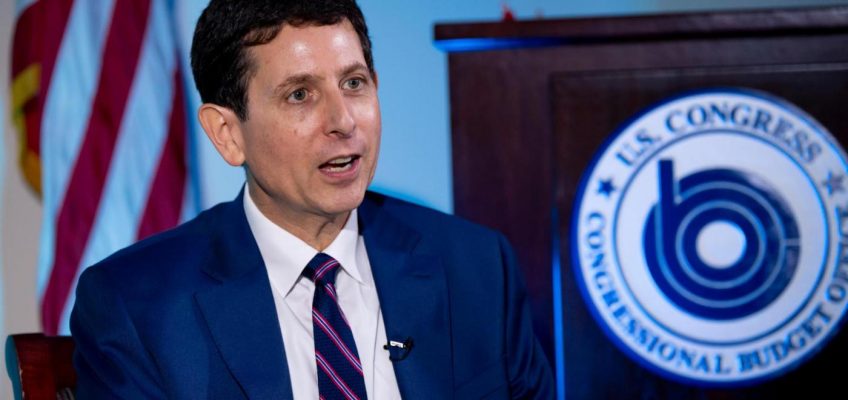By MICHAEL R. SISAK
FARMINGDALE, N.Y. (AP) — Four years ago, President Donald Trump was persona non grata in the professional golf world, ostracized from the sport he loves in the wake of the U.S. Capitol riot on Jan. 6, 2021. The PGA of America pulled his chance to host its major championship and officials in his hometown, New York City, tried ousting his company from the golf course it had hired him to run.
Related Articles
He’s the budget scorekeeper for Congress. Lately, it’s been a tough job
What we know about how a government shutdown would unfold
Ryan Walters resigns as Oklahoma’s top public schools official to lead conservative educators’ group
White House budget office tells agencies to draft mass firing plans ahead of potential shutdown
US lawmaker backs renegotiating global economic rules to reflect China’s rise
On Friday, Trump will be front and center at the Ryder Cup at Bethpage Black — welcomed to the first day of competition by the very powers that once shunned him. The Ryder Cup is run by the PGA of America, the organization that yanked its 2022 PGA Championship from his Bedminster, New Jersey, golf course.
U.S. captain Keegan Bradley said he’s “deeply honored” that Trump will be there to cheer on his squad. European captain Luke Donald said the president’s attendance “just shows how big the Ryder Cup is,” calling it a “mark of respect,” even if he’s rooting for the other side.
Trump, a Republican, will be the first sitting U.S. president to attend the biennial U.S.-Europe clash in its nearly 100-year history.
During his first term, he dropped in on the final day of the 2017 Presidents Cup at Liberty National in New Jersey.
His visit, expected in the late morning or early afternoon when the tournament is well underway, will mean extra security screenings in the areas where Trump is expected to be — near the clubhouse and first tee — and restrictions on what fans can bring. No rangefinders, laptops or tablets.
European stalwart Justin Rose predicted even more of a ruckus around the usually rowdy first tee when Trump is around. It’ll be a “very intense and entertaining” afternoon, he said.
“Obviously, he’s going to bring certainly a lot of attention and patriotism to the event,” Rose said. “It’s great for golf that he’s engaged in the game and obviously he brings a lot of eyeballs with him.”
But, U.S. and European players and captains alike say Trump’s presence won’t distract them from their overriding mission: beating the other guys. Rose even joked that Trump is invited to come back on Sunday and congratulate Team Europe, should the visitors win.
For Trump, an avid golfer, his Ryder Cup trip will be the culmination of a remarkable turnaround in his relationship with the sport — and in the sport’s relationship with him.
Next year, the Blue Monster course at his Doral resort near Miami will return to the PGA Tour schedule for the first time in a decade. Trump’s courses in Scotland and Ireland have or are slated to host European tour events. And, since his return to office in January, he hosted Tiger Woods, PGA Tour Commissioner Jay Monahan and the head of Saudi Arabia’s sovereign wealth fund in an unsuccessful attempt to fix golf’s PGA Tour-LIV Golf schism.
Three Trump-owned courses have hosted LIV events.
“I’m deeply honored that the president of the United States is going to come support our team at the Ryder Cup,” Bradley said. “I think anytime you can be around a current president is a pretty phenomenal thing, but when you’re representing your country at a place like Bethpage Black in New York, having the president there to support you is something that is just absolutely incredible. I’m really grateful to him for doing that for us.”
The feeling seems mutual. In a Truth Social post last month announcing his tournament visit, Trump praised Bradley as “an AMAZING guy” and said “It will be a great Ryder Cup.”
In addition, Trump is close with several U.S. players, including Sam Burns, Bryson DeChambeau and top-ranked Scottie Scheffler. Last year, Trump appeared on DeChambeau’s “Can I Break 50?” YouTube series, racking up more than 16 million views. Scheffler, who also has played golf with Trump, said he’ll sometimes get a congratulatory call or text from him after a win.
“He just loves the game of golf, and he’s one of those guys when you’re around him, he does such a good job of, like, feeding confidence into everybody around him,” Scheffler said. He said he wasn’t aware of any plans for Trump to address the U.S. team, “but I’m sure if things go well, we’ll hear from him.”
Trump has been on a run of attending major sporting events, showing up at the Club World Cup final in New Jersey in July, the U.S. Open men’s final in Queens in September and addressing the New York Yankees in their clubhouse before a game in the Bronx on Sept. 11. He’s also attended various UFC fights and is planning to stage one at the White House next year.
Now he’s headed to the heart of Long Island, where he won both counties in last year’s election. Already this week, several “Make America Great Again” hats have been spotted in the crowd during Ryder Cup practice rounds. But, just like the European team, politicians aren’t immune from jeers. New York Gov. Kathy Hochul, a Democrat, was booed when she was introduced at Wednesday’s opening ceremony.
“I really look forward to what that first tee is going to be like with the president on the tee,” Bradley said. “I think this first tee at Bethpage is going to be a sporting event to remember across any sport, and then you add on the president of the United States standing there, I really think it’s going to be something that everyone will remember forever.”
AP golf: https://apnews.com/hub/golf




